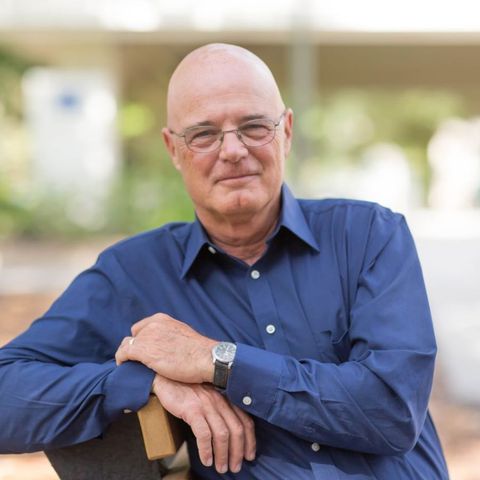Franciscan Spirituality Center - Brian McLaren

Descarga y escucha en cualquier lugar
Descarga tus episodios favoritos y disfrútalos, ¡dondequiera que estés! Regístrate o inicia sesión ahora para acceder a la escucha sin conexión.
Descripción
Franciscan Spirituality Center 920 Market Street La Crosse, WI 54601 608-791-5295 https://www.fscenter.org Steve Spilde: Today, it is my great privilege to welcome Brian McLaren to the podcast. Brian is a...
mostra más920 Market Street
La Crosse, WI 54601
608-791-5295
https://www.fscenter.org
Steve Spilde: Today, it is my great privilege to welcome Brian McLaren to the podcast. Brian is
a father, a husband, a preacher, a teacher, and the best-selling author of more than 20 books.
Richard Rohr has said, “Anything written by Brian McLaren is always filled with insight,
courage, and creative theology, refining the meaning of orthodoxy in our time.” Brian, I am
honored to welcome you to the podcast.
Brian McLaren: I’ve been looking forward to this, so I’m happy to be with you, Steve.
Steve: Brian, your new book is titled, “Do I Stay Christian?” In the beginning, you outline 11
different ways that one may identify as a Christian. As you’ve grown throughout your life, what
are some different ways that your personal meaning of what it means to be Christian has evolved
and changed?
Brian: I think this is part of what makes the discussion of Christian identity so complicated. It’s
defined in such opposite ways by different people. I grew up in a very conservative Protestant
family in the context people that today would call “fundamentalists.” In that context,
Christianity was defined primarily as a belief system. You had to adhere to certain beliefs, and
those beliefs identified you as a Christian. I think also, our little group emphasized experience.
There were certain spiritual experiences that you were supposed to have that would identify you
as a Christian. That was really my framework growing up. The problems began for me when I
found out that there were maybe the obvious list of beliefs that you had to have, and then there
was a bunch of fine print that kind of added to it. I remember being just a kid – sixth, seventh,
eighth grade – and finding out that I wasn’t allowed to believe in evolution, where I’d already
read enough science books that that made sense to me. I remember thinking, “Oh, no, what’s
this all about?” But I think other people grew up in very different contexts. For some of them,
they aren’t really faced with that many beliefs. But for them, it’s more of an institution, or
maybe even an authority structure that they are reverential toward. And for other people, it
might be actually more a matter of practices, like, “I go to church on Easter and Christmas, and I
had my babies baptized. That means I’m a Christian.” That’s more of a pragmatic kind of an
approach.
I think for some people these days, I hate to say it, but I think it’s true. There’s more of a
political and social construct that if you vote for certain candidates or identify yourself culturally
in a certain way, you see yourself as Christian. And there are many other ways that people
define it as well.
Steve: In what ways is your identity as a Christian more meaningful than ever? You’ve referred
to how your perspective has changed. I assume that that label has more meaning to you rather
than less.
Brian: Yes, it does for me, Steve, although obviously for other people they have a very
inflexible definition that they’re given. They reach a point where they say, “Well, according to
Brian McLaren Podcast
2
this definition, I don’t fit anymore.” That’s one of the reasons why many people leave the
Christian faith. As I said, growing up with a list of beliefs and then finding out that there was a
lot of additional fine print, that had certain benefits because you were with a group of people you
could always be sure they agreed with you. And in a sense, and when you’re in that setting, you
spoke the same language and you had the same assumptions and there was a feeling of safety,
and there’s many other dimensions to it that were very reassuring and meaningful. As I said, it
also became a little bit claustrophobic.
In my own spiritual development, one of the things that pulled me through is that … This might
sound almost like I’m making a joke, but I mean this completely seriously, I became a pastor
[and] I became a preacher and I actually had to read the Bible more, and I actually started
reading the Gospels more. And for me, my actual delight and fascination and interest in this
figure Jesus Christ became more and more compelling to me. What I realized is that many of
those very rigid definitions that I had learned from different Christian groups or denominations
or institutions were so out of sync with kind of the spirit and personality and value system of
Jesus. That really is what has through the years become more and more meaningful for me.
Información
| Autor | Franciscan Spirituality Center |
| Organización | franciscan spirituality center |
| Página web | - |
| Etiquetas |
Copyright 2024 - Spreaker Inc. an iHeartMedia Company

Comentarios